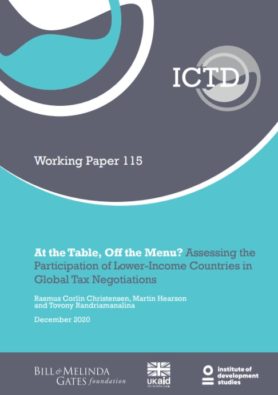Working Paper 115
Since 2013, the formal structure of global corporate tax policymaking at the OECD has changed. Decisions are no longer made by 37 OECD members, but by 137 countries from all regions and levels of development through the ‘Inclusive Framework’ (IF). Official documentation emphasises that all countries participate on an ‘equal footing’, but some participants and observers have emphasised that developing countries in particular face practical obstacles that lead to unequal participation in practice. In this paper, we assess these claims, drawing primarily on 48 interviews with negotiators, policymakers and stakeholders involved in global tax discussions. We find that the explosion in formal membership has not in itself led to the step-change in developing country influence that the raw numbers imply. This is because of a combination of structural obstacles that are not unique to the IF, and some challenging aspects of the OECD’s way of working. Yet, lower-income countries have made some modest achievements to date, and there are signs of incremental progress towards a more effective presence. We develop a typology of mechanisms through which successes have been achieved: association with the efforts of more powerful states, anticipation of lower-income countries’ needs by the OECD secretariat and others, collaboration to form more powerful coalitions, and the emergence of expert negotiators with individual authority.
